BBC's Blog, page 21
May 3, 2013
College of Production Roundup: Emmerdale and Winterwatch
I’m Paul Buller, editor of the BBC College of Production (CoP) website.
Our site is a free online learning resource for the radio, television and online production community offering videos, podcasts and articles from broadcasting innovators and experts.
This week we’ve got some really interesting examples of how big shows are engaging their viewers in brand new experiences online.
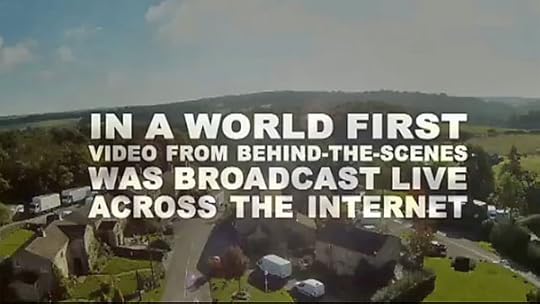
Film on the making of Emmerdale Live
Starting with ITV’s Emmerdale, we’ve a look at how the team put together the multiplatform extras for their incredible live 40th anniversary episode.
For the show’s producers, the 40th anniversary offered all the usual high drama as well as a perfect opportunity to attempt a world first in social media and broadcast innovation – a live episode produced entirely on location running alongside a behind the scenes webcast.
Both experiences gave loyal Emmerdale fans a totally unique angle on the drama with video from behind the scenes broadcast live across the internet. The behind the scenes segments were shot using 11 strategically positioned minicams so online viewers could see the crew working and the actors being cued as the live drama went out on ITV1.
Winterwatch, the BBC’s live, interactive wildlife programme, has led the way in terms of audience engagement and cross-platform programming.

Setting up a shoot for Winterwatch
This film on how they’re constantly improving and expanding their brand – even after ten years – is a real testament to how the team have listened to their online audience and given them a chance to really get involved every step of the way.
Finally, as you’ll have seen elsewhere on these pages, the recent Fusion: Future Fiction event held by the BBC was a great opportunity to learn about using the online world to tell your story.
Our intrepid team got stuck in and can bring you this interesting guide to transmedia storytelling as well as a podcast featuring interviews with some of the key speakers on the day. Enjoy.
Paul Buller is an editor for the BBC College of Production website.
May 1, 2013
Connected Studio: 12 months on
It has been some time since my last blog post on BBC Connected Studio and with so much happening I wanted to give an update on some of the recent activities and also reflect on the first 12 months of Connected Studio.
Recent News
So far in 2013 we have run three Connected Studio programmes for News, BBC iPlayer and Knowledge & Learning across the UK.
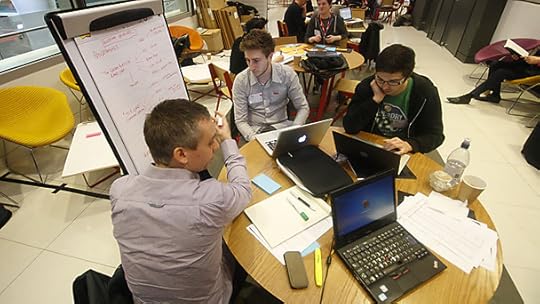
Teams brainstorm at the iPlayer Creative Studio in London
In these studios we have heard 83 compelling ideas developed and pitched to the BBC Online product teams in the creative studios with 25 of these developed into proofs of concept in the two day build studios. Eight of these proofs of concept have been taken through to pilot stage.
We now have a total of 27 pilots in various stages of kick-off, development, testing and review for potential integration into BBC Online in the future.
Late last year I blogged about the first 10 pilots. For updates on these and details about the next 17 I have asked our project manager Robin Cramp to write a series of blog posts over the coming weeks about these exciting new projects.
Those of you who have attended a Connected Studio event will know Robin as our own ‘unique’ master of ceremonies but he also does a sterling job overseeing all of our pilots from kick off to delivery. If these posts are anything like his compering skills I expect them to be rather entertaining as well as informative.
A year in numbers: 18, 1015, 75, 250, 251, 76, 27
Just over a year ago we published the first brief and introduced the concept of Connected Studio to the industry and staff and it feels right to take a moment to reflect on the first year.
The Connected Studio team has worked in partnership with nine of the BBC Online Product teams running creative and build studios for:
Homepage, Search and Navigation Weather and Travel CBeebies CBBC User Experience and DesignSport News iPlayer Knowledge and Learning
This has resulted in a total of 18 events in eight different venues playing host to over 1000 attendees including 491 BBC staff members and 524 attendees from 193 independent companies, freelancers or start-ups.
During the studios we provided over 75 insight sessions on BBC audiences, market, technical background, UX and strategy from a wide range of BBC experts.
We offered over 250 audience feedback sessions for teams to test their ideas as they were developed. We have heard a total of 251 concepts pitched and we have supported 76 of these to be developed into proof of concepts in the build studios.
We now have 27 pilots in development across the whole of the UK and we are working to bring a number of these into BBC Online in the near future.
This has been a new way of working for the BBC and we have learnt a lot of lessons in the last 12 months in all aspects of the programme which I will share in a separate post but for now I feel we have done pretty well.
What Next?
I am very pleased to announce the BBC will be continuing the Connected Studio programme to take on new challenges for a wide range of the BBC’s audience facing services and we shall share further details on this soon.
In doing this I hope we will continue to work collaboratively with the wider UK creative industries, in particular those with a slant towards original storytelling, a strong sense of user experience and a passion for emerging technologies.
In the meantime keep an eye out for blog posts about our next set of pilots.
Adrian Woolard is head of BBC Connected Studio.
April 30, 2013
DNA Refactor Project
I’m Mark Neves, a technical architect on the DNA Refactor Project.
What is DNA?
Regular readers of the Internet Blog will know that DNA is the platform that supplies User Generated Content (UGC) in the form of comments, messageboard posts and the like to the BBC website. It also powers the moderation tools needed to manage this content. For a brief history of DNA and how it got its name please visit Wikipedia.
The DNA Refactor Project
The DNA Refactor Project is focused on rebuilding the DNA functionality using best-of-breed software engineering techniques. This blog post explains how DNA became what it is today and the plans for ‘refactoring’ the code base into a modern architecture making the platform easier to maintain, faster to extend and portable to other platforms.
Evolution of the DNA Code Base

Coding began with the creation of the h2g2.com website back in 1999. It was initially a Perl application with a SQL Server back end. Shortly after its inception the platform was acquired by the BBC and developed over the years using many technologies by approximately 24 different developers. (While researching this figure I naturally hoped to find that 42 developers had worked on it. Still, 24 is practically the same, digit-wise.)
The first major refactor was the move to C++. As you can see some admin functionality remained in Perl for a very long time. The second major change was the decision to implement all new features in C# in around 2006 and have, as a background task, the job of migrating existing C++ functions to C#.
Again, like the Perl code before it, some features and tools remain in the C++ code base to this day. With tight time scales and limited resources it’s always difficult to justify spending time rewriting or refactoring existing code. It’s an age old issue in software development.
The last major architectural development was to implement RESTful APIs to expose functionality to support moderated comments (among other services), allowing the user-facing elements to be implemented on the central BBC application platform. This drives comments on BBC News and Sports pages as you see them today.
Why Refactor?
So why is the BBC investing in the refactoring of the DNA code base? After all, DNA has stood the test of time providing a rock solid, reliable platform for hosting UGC and Moderation Services even in the most demanding of situations (such as comments on high profile News stories, moderated Twitter feeds during the Olympics and the extremely busy but now decommissioned 606 sports messageboard).
UGC is an important aspect of the BBC website and will remain so for the foreseeable future. The platform that delivers this requirement needs to be built for the future. Let’s examine the current DNA architecture to see where the issues lie:

Current DNA architecture
With 24 developers working at different times over 14 years on the platform it’s not surprising that the code base is suffering from a little technical debt:
Another aspect is that the current code base has a large amount of functionality that is no longer used. The BBC sold h2g2 a couple of years ago and at that point the considerable amount of functionality that h2g2 exclusively used became redundant. Add to that the code behind other decommissioned social network sites like 606, Action Network, Get Writing and Comedy Soup and it’s clear that a lot of inactive code can be laid to rest.
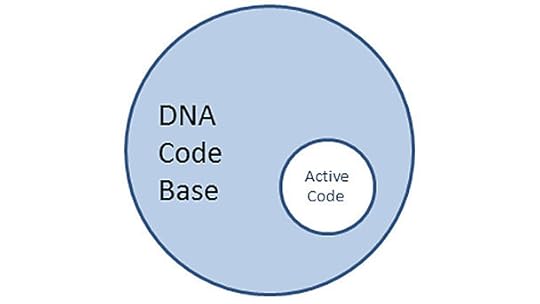
This is by no means a criticism of the way DNA has evolved. DNA has had a number of very talented software engineers working on it over the years. The history of the product is long and interesting and the code base gets a lot of things right. The time has come to take a step back and see how we can do things even better.
The Brave New World
The engineers in the DNA team have always been keen to embrace best practices when developing software. The DNA Refactor project will result in a platform that embraces S.O.L.I.D. software development principles:
S - Single responsibility principle: A class should have only a single responsibility.O - Open/closed principle: “software entities [… ] should be open for extension, but closed for modification”.L - Liskov substitution principle: “objects in a program should be replaceable with instances of their subtypes without altering the correctness of that program.”I - Interface segregation principle: “many client-specific interfaces are better than one general-purpose interface.”D - Dependency inversion principle: One should “Depend upon Abstractions. Do not depend upon concretions.” Dependency injection is one method of following this principle.
Here’s what the new architecture will look like:
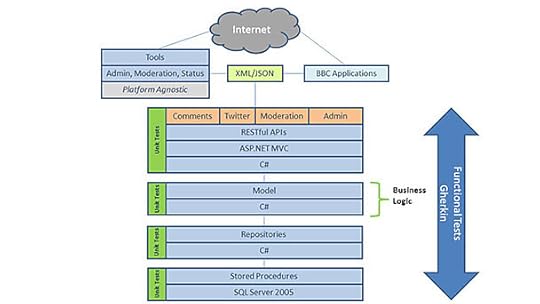
The new DNA architecture model
The main features are:
It’s easy to see how you each layer could be ported to different platforms and technologies. The BDD tests would provide confidence that all the functionality has been ported successfully.
It would be interesting to hear your feedback/comments below.
Mark Neves is a technical architect.
April 26, 2013
What's on BBC Red Button 27 April - 4 May
Snooker dominates the Red Button this week with plenty of highlights and live coverage available around the clock to suit your schedule. You can also catch up with what you’ve missed on BBC iPlayer.
We’ll also be showing Final Score on Saturday afternoon where you can follow the action around the grounds with all the drama of promotion and relegation in the penultimate day of League One and Two, as well as the Super League Show and Scrum V.
World Championship Snooker coverage

Ronnie O'Sullivan during his return from retirement, at the World Snooker Championship
The 76th World Snooker Championship is well under way at the Crucible. We’ve already seen the return of Ronnie O’Sullivan, a shock defeat to four-time champion John Higgins and a new fan favourite in the relatively unknown Dechawat Poomjaeng.
The Red Button will be showing action from The Crucible at the following times:*
Saturday 27 April: 10am-2.30pm, 7pm-11pm
Sunday 28 April: 10am-11pm
Monday 29 April: 10am-11pm
Tuesday 30 April: 10am-1.30pm, 2.15pm-11pm
Wednesday 1 May: 10am-11pm
Thursday 2 May: 1pm-11pm
Friday 3 May: 10am-7.30pm
*Live sports times are subject to change
Highlights from the day’s action are available from 6am-10am, then back on at 11pm through 6am every day this week apart from Friday. For a full list of all the snooker timings on BBC Two HD, online and Red Button click here.
Changes to snooker on the Red Button
Red Button has changed in the past few months and is now ‘single stream’ across all platforms, in line with Delivering Quality First changes. This means we cannot show more than one match at a time on the Red Button. You can read why these changes were made in this blog post.
Because of these changes, we cannot allow overruns or push back on other scheduled sport content on the Red Button (such as Final Score on Saturday afternoon) and live content may be cut short. During Final Score on Saturday and the Super League Show on Tuesday you can keep up with the live snooker via the BBC Sport website and Connected Red Button.
Antiques Roadshow play along
The popular Antiques Roadshow play along is on a break until next week - but you can still join in on Sunday 28 April and guess the valuations using the free mobile phone app.
BBC Red Button on Virgin TiVo
Connected Red Button does not currently feature eTV (enhanced TV) streams on the Virgin TiVo service. While users can already enjoy live coverage and highlights from a range of sporting events on the service, we are working to extend this capability to a wider range of events during 2013.
For further news on Red Button you can visit www.bbc.co.uk/redbutton and follow us on Twitter @BBCRedButton.
Links: iPlayer Radio on Android and the rise of tablet streaming
Hi everyone and welcome to another round up of news about BBC Online.
We announced the launch of the new BBC iPlayer Radio app on Android earlier in the week and the feedback has, for the most part, been positive both on the blog and across the industry.
As Digital Spy commented:
“The folks at the Beeb took their time porting the service to the fragmented Google operating system, but they've put a lot of care and creativity into tailoring it appropriately.”

The new BBC iPlayer Radio app on Android mobile and tablet devices
PC Advisor praised the new version of the app:
“Navigating through the app is very pleasing, with a beautifully implemented dialler […]The schedule itself is a delight to use and is an easy way to keep track of what is coming up. It may seem slightly odd breaking the radio side of iPlayer away into a separate app, but it many sense it makes sense, and the dedicated interface is something that works very well indeed.”
While comments on James Simcock’s post were mixed:
# Kevin “This sounded great, particularly the alarm to radio feature. However, not being available prior to Android 4 is a massive let-down.”
# Plastix “Very big thank you for creating a native android app from the ground up, and not simply an iOS port. Having quickly tested it, it is already leaps and bounds ahead of previous attempts to create android apps. Good job.”
The release of the iPlayer press pack for March also provoked a lot of discussion.
Maintaining the high post-Christmas viewing figures, the big story was the continued growth in tablet viewing which for the first time surpassed requests on mobile by 200,000.
“[iPlayer] is exactly the sort of app you’d expect to thrive on the tablet form factor — which is both portable and has a screen that is large enough to view high production value video content without compromising the overall viewing experience. And the BBC’s iPlayer data bears this out: with considerably higher tablet usage for TV programmes vs radio content.”
In response to both these figures and the release of the iPlayer Android app this week Forbes have published as interesting article discussing the future of content streaming for the BBC. As Ewan Spence comments:
“Streaming video is not an easy thing to do, and when you are expected to cover every single new device that hits the market, there is not an easy solution. […] Everyone needs to be aware that the BBC is going to have to spend more of their budget on online services and less on programming. Streaming technology is not a new technology, and the BBC is not creating a new market with the iPlayer, they are simply following public demand. Calls for them to slow down spending on the iPlayer in 2013 to allow space for commercial organisations to ‘catch up’ should be balanced against the public demand for the service, and the public demand should win out.”
Inside Secure, suppliers of embedded software and digital security systems have been working with the BBC on technology enabling the download of TV content to mobiles and tablets for a period of 30 days. The INSIDE Downloadable DRM Fusion Agent is integrated into the BBC iPlayer iOS app which should be released on Android in the near future.
As reported by The Register:
“Fusion Agent, as Inside Secure calls its DRM platform, is now shipping in the iOS version of iPlayer, and the software is already ported to Android 4 (Ice Cream Sandwich and above), so support for iPlayer to download onto platforms beyond iThingies should hopefully arrive soon, delivering a good part of the "feature parity" promised by the BBC late last year.”
If you’re interested in developing for Android then you may be interested in a job opportunity in BBC News.
And if you’re just starting out in the industry check out the new Technology Apprentice scheme run by the BBC and other broadcasters.
That’s all for this fortnight folks, hope you enjoy the sun this weekend.
Eliza Kessler is content producer for the BBC Internet blog.
April 25, 2013
Changes to the Internet blog: Comments and Twitter
Hi everyone
You may have noticed that we have a new ‘recently commented’ module to the left hand side of the blog page. This updates automatically when a new comment is added to a post and means it’s easier to spot when new questions, comments or feedback requests are added.
Now the module has gone live we will be extending the length of time posts on the blog are open for comment to a month. I hope that this extended window for commenting will help the blog stay relevant and better reflect your opinions and feedback.

@bbcinternetblog
We are also making changes to our Twitter accounts. We currently have two Twitter accounts:
@bbcinternetblog where we tweet our own posts and other blogs and related content from within the BBC and @bbcinterntlinks where we tweet news articles and other BBC Online related content and conversations from external sites.
You can see the tweets we send out from each account on the Twitter module just below the new recently commented box on the right left hand side of the blog page.
When we first opened our twitter accounts roughly three years ago it made sense to have two accounts differentiating between external and internal content. But now we are using the Twitter module as a way of exposing links and stories on the blog, having two accounts is confusing.
The world of Twitter has moved on a lot in three years and it makes sense to now amalgamate the two accounts.
We will therefore be closing our @bbcinterntlinks account and tweeting all content, both internal and external, from @bbcinternetblog from now on.
We will include a reference at the beginning of each tweet to identify the source of the information so you will know what comes from the BBC and what originates elsewhere.
We will be making more changes to the blog over the next few weeks so watch out for improved content curation and navigation modules.
I would be interested in hearing what you think of these changes so please leave a comment below, anytime within the next month!
Eliza Kessler is the content producer for the BBC Internet blog.
Live Twitter Q&A on Technology Apprentice Scheme
I’m Simon Broad and I’m a Programme Manager with the BBC Academy Schemes.
Recently my team helped launch the BBC’s new and ground-breaking apprenticeship for school-leavers interested in technology.
In order to see this content you need to have both Javascript enabled and Flash Installed. Visit BBC Webwise for full instructions. If you're reading via RSS, you'll need to visit the blog to access this content
Find out more about the BBC Technology Apprentice Scheme
We are really excited about it as it gives young people a great opportunity to get into broadcast and media technology.
For many reasons all broadcasters are finding it difficult to recruit broadcast engineers. There aren’t enough university courses that offer the right mix of media engineering and computer science, and lots of companies are trying to hire scarce technology talent.
So with the help of some government co-investment and the support of ITV, Channel 4, Arqiva, Red Bee Media and Creative Skillset, the BBC has worked with universities to develop a degree level Apprenticeship (level six) so that when you graduate you’ll have an engineering degree, an impressive CV thanks to work experience with the BBC and our partners, and no debt - at least no student loan as the Scheme pays your university fees alongside an Apprentice salary
Today we are holding a live Q&A on Twitter between 1pm - 2pm where I will be answering questions you may have about the scheme so please tweet us at @bbctrainees using the hashtag #bbctechapp.
The cut off for applications is the 19 May so visit the BBC Careers website to find out more or watch the video above.
I'd welcome any questions you have on the scheme either in the comments below or via Twitter.
Simon Broad is Manager for the BBC Technology Apprentice Scheme.
April 24, 2013
BBC iPlayer Radio app on Android devices
I’m James Simcock, executive producer for mobile in BBC Radio and assisting as product owner in the build team for BBC iPlayer Radio on mobile devices.
Together with Chris Kimber, the executive product manager for BBC iPlayer Radio (across platforms) and the mobile development team in Salford, I’m excited to announce the launch of BBC iPlayer Radio for Android.
This app has all the features of the iOS app as well as some improvements that, as an Android user myself, I think make it even better.

For the very first time this app is now also available on tablets including the very popular Amazon Kindle Fire HD. You can download the app from the Google Play store now and it will be available shortly in the Amazon app store.
What you’ll find in the app
The BBC iPlayer Radio app transforms your access to BBC radio programmes. With the app you can wake up with your favourite breakfast show and instantly find the breadth of BBC Radio at your fingertips.
Specific features include the ability to:
Set the alarm and wake up with your favourite DJ or programme.Spin through the touchscreen dial and listen live to the whole range of BBC Radio stations.Swipe to reveal on-demand catch-up content and videos on every station page.Set programme reminders to ensure you never miss favourite shows and add tracks to favourites.Easily discover what tracks are playing and share with friends.
The app surfaces a wide range of content including the BBC’s wealth of radio shows to watch and listen to live or via catch-up, wherever you are. There are also hundreds of podcasts, on-demand programmes from the past seven days and video clips from music sessions, events, gigs, festivals and your favourite DJs.
We hope you enjoy all the content the app includes and we will be introducing more content and features to BBC iPlayer Radio over the year ahead. This includes the ability to access full on-demand programmes from English local radio or the Nations stations.

BBC Radio iPlayer app on mobile and tablet devices
Bringing iPlayer Radio to Android devices
Since Adobe Flash is no longer available on Android devices we decided to launch the new Android app with a new range of audio streams that use the ‘HLS’ protocol (HTTP Live Streaming). This protocol works really well on Android devices operating on version 4.0 or above (Ice Cream Sandwich, Jelly Bean and beyond).
Looking at the stats I can see that the majority of Android devices currently visiting iPlayer Radio via a browser are running more recent versions of the software and Google’s own app store data backs this up.
On average around 80% of installs of current BBC products are on Ice Cream Sandwich (version 4.0) and above.
Using HLS has a number of benefits including the ability to efficiently access high quality live and on-demand audio whilst allowing you to continue to use other apps on your device at the same time, and allows us to develop exciting new features in the future.
Building the new Android app
Since we launched the new BBC iPlayer Radio in October last year we have been learning more about how audiences use the product.
With this in mind we’ve followed a slightly different design pattern for the Android version of the app which not only leans heavily into the navigational paradigms of the platform (making it familiar to most Android users) but also makes it quicker than ever to discover more content offered by most of our radio stations.
On iOS some content is tucked beneath the ‘currently-playing content’ area on the screen, revealed by swiping upwards to show a ‘carousel’. However, on Android simply swiping horizontally will take you through all the content from the currently selected station.

Video clips and featured content
This also means we have more space to play with when considering additional functionality and extra content in the future. We will look at how we can reflect this model in our iOS app in the near future as well.
Other differences between the Android and iOS versions of the app include the use of the notifications panel which appears at the top of the screen when you are elsewhere on your phone, making it easy to get back to the app.
There is also an alarm clock which works regardless of whether the app is active. Sharing programmes and tracks is also more ‘open’, using the extensive sharing functions of the Android platform to make programme URLs or artist and track names available to any application you have installed which can make use of such links.
Some existing challenges
While we wanted to launch the app to all Android users as soon as possible there is currently an issue with some Samsung firmware. This means that some owners of the popular and powerful Galaxy S3 device may not be able to stream our new HLS audio in the short term.
This applies specifically to some Galaxy S3 devices on EE, Vodafone and Three and we expect these networks to roll out a fix in the next month.
For clarity, Galaxy S3 users who did not purchase their devices directly via one of these three mobile network operators should experience no problems with the app and the folks at O2 have already rolled out Samsung’s patch so users on the O2 network should be all set.
Your feedback
We will, as always, keep a close eye on your feedback so do please let us know how you find your experience using the app. As well as via reviews in Google Play and the Amazon app store, you can contact us via twitter @BBCiPlayerRadio, via email at radiofeedback@bbc.co.uk or leave a comment below.
When leaving a comment it really helps if you can be specific about which device you are using, which firmware you have installed (which can usually be found in the ‘about’ section of the settings menu on your device) and if connecting over mobile networks to include details of your network operator. We hope you enjoy using the app and look forward to hearing your feedback.
James Simcock is executive producer for mobile in BBC Radio.
April 23, 2013
News Labs and The News Juicer at Yahoo! Hack Europe
Hi I’m Matt Shearer, delivery manager for Future Media News. I manage the delivery of the News Product and I also lead on BBC News Labs.
I recently wrote about BBC News Labs and the BBC News Juicer.
The News Juicer is a platform that digests what we publish on bbc.co.uk/news, ‘Juices’ key pieces of information from this content (‘People’, ‘Places’ and ‘Organisations’) and finally adds these as ‘Tags’ against each News article.
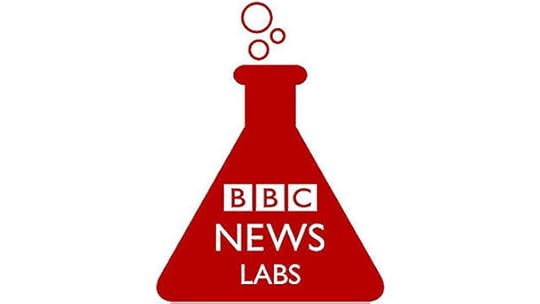
We can then arrange content using these tags.The News Juicer has ‘Juiced’ more than 83,000 BBC News and Sport articles published between 2001 and now and this provides BBC News with a great dataset to experiment and test product concepts.
I am pleased to announce that The BBC News Juicer will be making an appearance at Yahoo! Hack Europe in London on 27 and 28 April when participating developers can get access to our APIs.
If you are taking part in the event you will be able to take advantage of more than 83,000 linked data-tagged BBC News and Sport articles using DBpedia identifiers for People, Place, Organisation and ‘Theme’.
We are really pleased to be taking part in this event, and this represents a key step in exposing News Labs’ activities to the wider industry. We plan to do more of these types of innovation events and to stay abreast of our developments, you can follow @BBC_News_Labs on Twitter.
Special thanks to Murray Rowan at Yahoo as well as BBC News & Knowledge, Online Technology Group, BBC Linked Data Platform and BBC Connected Studio for their continuing support and to Mashery for their great toolset.
Matt Shearer is delivery manager for BBC Future Media News.
BBC Homepage on Twitter
I’m Clare Hudson, executive editor, BBC Homepage, Search and Navigation.
The 25-strong editorial team I belong to curates content for a number of BBC services including the BBC’s desktop and mobile homepages, editors’ picks in BBC Search, the pictures accompanying each programme in BBC iPlayer and the menus and services that you see if you press the red button.

@bbccouk
Today we’re extending our coverage outside the BBC’s digital domain and into the wider social networking space by launching a Twitter account @bbccouk.
So what will you get if you follow @bbccouk on Twitter? Well, we’re an editorial team rooted in ‘one service’ traditions - not wedded to any product or service, not aligned to a channel or programme brand – so we’ve got a clear, impartial view of the entire BBC offering.
We’re experienced in handpicking the best of the BBC’s content from the latest breaking news to the most popular clip available on catch up.
We have a busy planning team that has contacts right across the BBC so if it’s important and it’s happening soon the chances are we will be on to it and ready to let you know as soon as possible.
Why Twitter? Our research indicates that Twitter is becoming an increasingly important route for audiences to find BBC content, out-performing Facebook in some areas.
It’s also an excellent way to share links which is one of the team’s fundamental roles. Being part of the Twitter community will also let us share in the real-time conversations and trends taking place there and allow us to see what audiences like and don’t like about BBC content, particular during live events.
We’re interested to know how you think the BBC could better reach audiences using social networks. Let us know below and follow us on Twitter @bbccouk.
Clare Hudson is an executive editor, BBC Homepage, Search and Navigation.
BBC's Blog
- BBC's profile
- 28 followers



